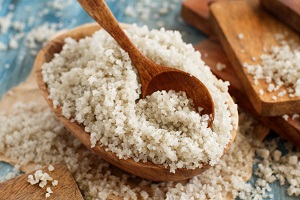Top 10 Celtic Salt Benefits
Most likely, you’ve heard about Celtic Sea Salt, but are you aware of its benefits? It’s a nutritional powerhouse as well as a flavor enhancer.

Rich in minerals and containing less sodium than ordinary table salt, it may be your hidden health ally.
Let’s explore the world of Celtic Sea Salt and learn how to use it in your diet to get the most advantages. Additionally, you will discover how it compares to other salts.
The Power of Celtic Sea Salt
Celtic Sea Salt is a real gem when it comes to all-natural, nutrient-dense substitutes. With 84 recognized minerals and trace elements, this exceptional salt does more for you than merely enhances the flavor of your food.
Discover the 10 amazing health benefits of Celtic Sea Salt, making it an essential addition to your diet. But firstly;
Celtic Salt Overview
Celtic Salt (pronounced “Keltic”) is also known as grey salt. The salt was first gotten from Brittany, France, but over time, it was sourced from several coastal regions in Guatemala, Hawaii, and other areas.
For ages, people have been harvesting it using traditional methods along the shores of the Celtic Sea. Celtic sea salt is unique because of its light grey color and wet texture, which are caused by the clay that is present in the area.
What is Celtic Salt?
Compared to regular table salt, Celtic salt has a stronger flavor and is healthier. It’s a great option for use in soups, stews, salads, and roasted vegetables because of its distinct texture and mineral richness.
One method of producing Celtic Sea Salt is to evaporate lake or ocean water. It tastes and feels different than table salt. In addition, sea salt has trace minerals in it, which differ according to the type of water the salt was made from.
It is well-known for having a wet consistency and coarse texture, which make it perfect for seasoning and cooking.
There are two types of Celtic salt: coarse ground and fine ground, depending on the application. While the finely ground Celtic sea salt is more appropriate for use in baking and cooking, the coarse texture of the salt makes it perfect for use as a finishing salt.
Nutritional Profile of Celtic Salt
The following concentrations of dissolved salts were reported in 100g Celtic salt:
- Calcium 287 mg
- Iron 11 mg,
- Magnesium 34 mg
- Manganese 1 mg
- Potassium 109 mg
- Sodium 34 grams
How to take Celtic Sea Salt
Celtic sea salt adds mineral enchantment to any recipe with its distinct texture and delicate flavor of sea salt. Expert culinary chefs prefer it for presentation and final touches. Celtic salt can be used in baking and cooking in the following ways:
- Use it as a “finishing salt” by sprinkling, it just before serving on meats, salads, veggies, popcorn, and other snack foods
- Mix some with oil, vinegar, broth, and other marinade components by whisking or stirring and it works wonders for bringing meat as well.
- To produce rubs, seasonings, and flavored salts, mix dried herbs, citrus zest, vanilla, and spices and keep them enclosed in a sealed container.
- Mixing spices or citrus zest with a mixture of Celtic salt can be used to coat the edges of cocktail glasses for a festive entertaining touch.
- Use it to make bread: When kneaded into dough; the wet crystals distribute uniformly and give the dough a flakier texture this also applies to pizza dough.
- Stir into simmering stocks, chowders, tomato sauce, and even oatmeal
- Prepare a salt crust by encasing meat or fish in a salt mixture that has been moistened and baked.
Celtic Salt Benefits and Side Effects
Incorporating Celtic sea salt into your cooking not only gives a meal a distinctive touch but also offers several unexpected health advantages. It can ease joint pain, encourage the growth of healthy cells, and repair damage to the skin.
Although it has many health advantages and enhances flavor, too much Celtic sea salt should not be consumed. Whichever salt you prefer, remember that excessive sodium consumption is associated with high blood pressure, kidney stones, and other health issues.
Celtic Salt Benefits
Celtic salt’s high mineral content is one of its primary benefits. Numerous vital minerals, such as potassium, magnesium, and sodium, are present in salt and are crucial for preserving bodily health.
Several health benefits might be provided by the wide combination of minerals found in Celtic sea salt. The following are some ways that this sea salt may improve health:
- Balance of electrolytes – The presence of sodium, magnesium, calcium, and potassium helps restore electrolytes lost due to perspiration and stress. This preserves neuronal function and fluid homeostasis.
- Hydration: The minerals help the body absorb and hold onto fluid. Hydration can be enhanced by consuming a pinch of Celtic salt mixed with water.
- Respiratory health: According to some advocates, the minerals help with respiratory ailments including colds, coughs, and asthma by thinning mucus discharges in the lungs and nasal passages.
- Heart health: Magnesium, potassium, and calcium are heart-healthy minerals that aid in blood pressure and circulation regulation.
- Nutrient Boost for Your Garden: Celtic Sea Salt has health benefits beyond the ordinary; it can increase the intake of nutrients in your potted plants, encouraging improved growth and vigor.
Other Celtic Salt Benefits are:
- Aids in the immune response’s defense against inflammation and infection.
- When mixed with warm water, Celtic sea salt can help soothe skin irritations and encourage healthier skin.
- You may increase food-nutrient absorption by up to 7% by adding Celtic sea salt to your meals.
- The flavor and taste of your food are improved when you incorporate Celtic sea salt into your cooking.
- Minerals found in Celtic salt are critical for healthy brain function, sound sleep, and the prevention of irregular heartbeats.
- Prevents respiratory issues and opens up nasal passages
- Celtic salt relieves cramps and is essential for healthy muscle function.
- There have been some claims that Celtic salt can encourage your body’s cells to grow.
- Helps with arthritis and regulates blood pressure
- Boosts digestion and reduces mucus
Celtic salt benefits for high blood pressure
Celtic salt benefits blood pressure by providing people with high blood pressure with several advantages. Some of these include:
- Vital minerals like calcium, magnesium, and potassium are found in Celtic salt which is recommended by medical professionals as a means of assisting in the reduction of high blood pressure.
- Celtic salt’s electrolytes contribute to the body’s fluid balance, which is essential for controlling blood pressure.
- Celtic salt is a better option for people with high blood pressure because it contains less sodium than regular table salt.
Benefits of Celtic Sea Salt for Thyroid
Celtic salt benefits; Mayo Clinic: Iodine deficiency may be the cause of hypothyroidism. This salt has a modest amount of iodine, which is necessary to produce thyroid hormones. Iodine, which is necessary for thyroid function, can be found naturally in Celtic salt.
Goiter, hypothyroidism, and other thyroid-related health issues can result from iodine deficiency. Including Celtic salt in your diet can support a healthy thyroid and help prevent iodine deficiency.
Celtic Salt Benefits in Water
The idea behind the claim that Celtic sea salt can enhance hydration is that the magnesium content of the salt facilitates better water absorption by the body.
Perhaps the best way to increase hydration is to figure out how to make drinking water more enjoyable. Drinking water can be flavored with Celtic salt. It’s crucial to remember, though, that consuming excessive amounts of saltwater can be bad for your health.
It is advised by the Mayo Clinic that adults consume no more than 2,300 milligrams of sodium daily.
Celtic Salt Benefits for Skin
Celtic Sea Salt can help soothe skin irritations and encourage healthier skin when mixed with warm water. It has a naturally calming effect because of its organic plankton and magnesium content.
Celtic Salt Benefits vs. Himalayan Salt
The argument over whether Himalayan or Celtic salt is better has been up for debate for a while. Their mineral makeup and place of origin are the primary distinctions between these two salts. The Atlantic Ocean and Spain are the sources of Celtic sea salt.
On the other hand, Himalayan salt is derived from historic salt mines situated in the Himalayan mountain ranges’ foothills. Himalayan salt and Celtic sea salt are two natural, unrefined salts that are popular among health-conscious consumers.
Here are some differences between Himalayan salt and Celtic sea salt:
- Taste: Himalayan salt tastes slightly sweeter and softer than Celtic sea salt, which is stronger and saltier in flavor.
- Appearance: Celtic sea salt is frequently darker because it contains trace elements while Himalayan salt gets its pale pink color from the high concentration of iron oxide in the deposits.
- Constituents: Celtic sea salt has more calcium and magnesium and less sodium, but Himalayan salt has more potassium. While both varieties of salt have significant mineral content, the mineral content of Himalayan salt is higher.
- Storage: To preserve flavor and reduce moisture release, Celtic sea salt is frequently kept in larger grains than Himalayan salt, which is typically ground more finely.
Because of its higher nutritional content, the best Himalayan salt is therefore preferable to Celtic salt. Still, the decision between these two salts primarily comes down to taste and purpose.
Celtic Sea Salt Side Effects
There is proof that an excessive sodium intake is detrimental to cardiovascular health and can cause hypertension, or high blood pressure. Low to moderate sodium levels, however, are safe. A recommended adult’s daily sodium intake is no more than 2,300 mg.
The maximum amount is 1,500 mg per day for those who have a history of heart disease or who
An excessive amount of sodium in the diet can cause bloating, fatigue, dehydration, weakness, agitation, and twitching of the muscles. A sodium and water imbalance in the body can lead to hypernatremia.
Furthermore, it’s crucial to make sure you’re getting enough iodine from other food sources in your diet if you’re eliminating table salt from it. Apart from iodized salt, naturally occurring iodine can be found in foods such as eggs, dairy products, seafood, and seaweed.
If you don’t often eat any of these foods, going with iodized sea salt could be a wise choice to ensure you’re getting enough of this important mineral each day and prevent an iodine deficiency.

Conclusion
In general, foods high in nutrients, like Celtic salt, can offer several health advantages. Because of its high mineral content, it’s a great substitute for table salt, which is frequently overly processed and devoid of its original mineral makeup.
You can make sure you are getting the vital minerals your body needs to function at its best by including Celtic salt in your diet.
FAQs
How much Celtic salt per day? ~ How much Celtic sea salt to add to drinking water?
In addition to using Celtic Sea Salt as an ingredient in your cooking and as a garnish for your food, naturopaths and other health professionals who are aware of the advantages of including a high-quality salt in your diet recommend drinking anywhere from a half teaspoon to an entire teaspoon of Celtic Sea Salt mixed with one of your daily glasses of water.
Can I get Celtic salt near me? ~ Where to buy Celtic salt?
Yes! You can get Celtic salt from online vendors at a reasonable price.
Is Celtic salt beneficial for me?
Celtic salt benefits; Reddit: Because it has not been processed to remove any of the 84 trace minerals essential for our bodies’ ability to maintain and repair itself, celtic sea salt is considered a healthy food choice.
How to take Celtic salt for health benefits?
Celtic salts benefit; Dr. Axe: The body will be alkalized, blood sugars will be balanced, mucus accumulation will be eliminated, immunity will be built, cognitive function will be improved, energy will be increased, and electrolytes will be provided.
The method requires that you allow a few crystals of Celtic sea salt to dissolve on the tongue before drinking water to boost water absorption in the body due to the magnesium that is included in Celtic sea salt.
What is the Celtic salt treatment?
According to one particular trend, you can increase your body’s level of hydration by dissolving a few crystals of Celtic Sea salt on your tongue before consuming water. This is mainly due to the Celtic Sea salt’s magnesium content, which is thought to improve water absorption.
Can you put Celtic Sea salt in the water to drink?
This Sea Salt Should Always Be Added to Your Drinking Water!
Premium sea salt has the ideal concentration of trace minerals. Not table salt, which is solely sodium-containing. It is known that two varieties of sea salt—Celtic and Himalayan—have elevated concentrations of these invaluable elements
Is Celtic salt healthier than table salt?
No, is the response. Gray salt does tend to contain somewhat higher amounts of calcium, potassium, and magnesium than table salt, as the graph below illustrates. None of these minerals are present in concentrations that would be harmful to a person’s health.
What are the side effects of Celtic sea salt?
It’s a well-established fact that every kind of salt contains sodium.
But does the salt from the Celtic sea raise your blood pressure? If an excessive amount of salt is taken, it can contribute to an increase in one’s blood pressure, as both of the dietitians that we consulted with informed us.
Is Celtic salt alkaline?
What makes Celtic Sea Salt unique? It’s the alkaline pH, as well as the abundance and harmony of minerals, such as calcium, iron, magnesium, potassium, and sodium chloride
What is another name for Celtic salt?
Celtic salt, also known as Celtic sea salt is extracted from seawater in the estuaries around the town of Gurande in France. In French, this type of salt is referred to as Sel Gris, which translates to “gray salt.”
Why is it called Celtic salt?
Paludiers, who regularly scrape the salt beds, are responsible for its hand-harvesting. Because they harvest the salt using wooden rakes by Celtic tradition and prevent any metal from coming into contact with the salt, the resulting salts are also referred to as Celtic salts.
Does Celtic salt help you sleep?
Magnesium is a necessary mineral for nerve function, and it can also assist in improving brain function, promoting peaceful sleep, and avoiding irregular heartbeats. Magnesium deficiency can lead to a variety of health problems.
When should I drink Celtic salt water?
After an intense workout, after a long night out, or even just while you’re drinking water throughout the day, this is an excellent routine to get into. Place a large crystal of Celtic sea salt, or several smaller ones, on your tongue.
You can also use a couple of the smaller ones.
What are the benefits of bathing in Celtic Sea Salt?
When you take a bath with unrefined sea salt, you are providing your body with additional minerals and electrolytes.
This allows you to detoxify and re-mineralize while you are enjoying the therapeutic benefits of a bath. Your preference will determine whether you go with the coarse or the fine option.
Why is Celtic Sea Salt so expensive?
Due to the different methods used to collect it, Celtic sea salt typically carries a higher price tag than table salt.
Is Celtic salt iodized?
Iodine is one of the minerals that may be found in Celtic Sea Salt, which also contains the natural balance of minerals that are found in ocean water. Since iodine is only found in very low concentrations as a trace element, you cannot rely on Celtic Sea Salt as your sole source of iodine.
Can you cook with Celtic salt?
Celtic Salt is unprocessed, thus it still contains a wide variety of minerals. In contrast, normal table salt undergoes a significant amount of processing and is frequently devoid of these naturally occurring elements.
Is Celtic Sea Salt good for use in all kinds of different kinds of cooking?
Why, yes, of course!
Who should not use Celtic salt?
Those who have kidney illness, high blood pressure, or heart failure may require extra caution when it comes to the amount of sea salt and table salt they consume. However, the majority of one’s sodium consumption does not come from just salting their food.
What is the difference between sea salt and Celtic salt?
The word “sea salt” refers to any type of salt that is obtained by the process of evaporating saltwater. There is a wide variety of sea salt, each of which possesses a distinct flavor and assortment of minerals in its own right.
Celtic salt is a kind of sea salt.
Can I replace table salt with Celtic Sea Salt?
Both table salt and sea salt can be used for many of the same culinary applications, but the two types of salt are distinct in terms of their texture and the trace minerals that they contain.
Does Celtic sea salt expire?
Salt does not go bad because it is a mineral and not an organic thing like other foods
Is Celtic salt good for diabetics?
One additional benefit of Celtic sea salt is its ability to maintain a steady blood sugar level. Diabetes patients often struggle to keep their blood sugar levels stable, and this is precisely the situation in which Celtic sea salt can be of tremendous assistance to these patients.
Does Celtic salt have zinc?
Sea salt has trace amounts of selenium, copper, iron, zinc, manganese, and chromium, all of which are absent in typical surface water but can be found in sea salt.
Why is Celtic sea salt better than table salt?
Refined salt is composed of two harsh minerals that, if injected into the bloodstream, can have adverse effects on the body.
Celtic Sea Salt, on the other hand, is manufactured from hand-harvested seawater that has a balanced mix of 82 minerals, one of which is magnesium, which can assist in the process of water being absorbed into cells.
What minerals are in Celtic salt?
Celtic salt benefits minerals: It is rich in a wide variety of essential trace minerals, including magnesium, potassium, selenium, copper, zinc, iron, and manganese, among others.
When compared to Himalayan salt, Celtic salt has a trace mineral level that is significantly higher at 17.5%
Is Celtic salt organic?
According to Dr. Brian Clements’s research, this particular salt contains only 71% to 74% sodium chloride, in contrast to the vast majority of other salts, which have 98% sodium chloride.
The remaining proportion is made up of organic minerals and trace elements (including calcium, potassium, magnesium, iron, manganese, sulfur, zinc, and a variety of other nutritional components).


